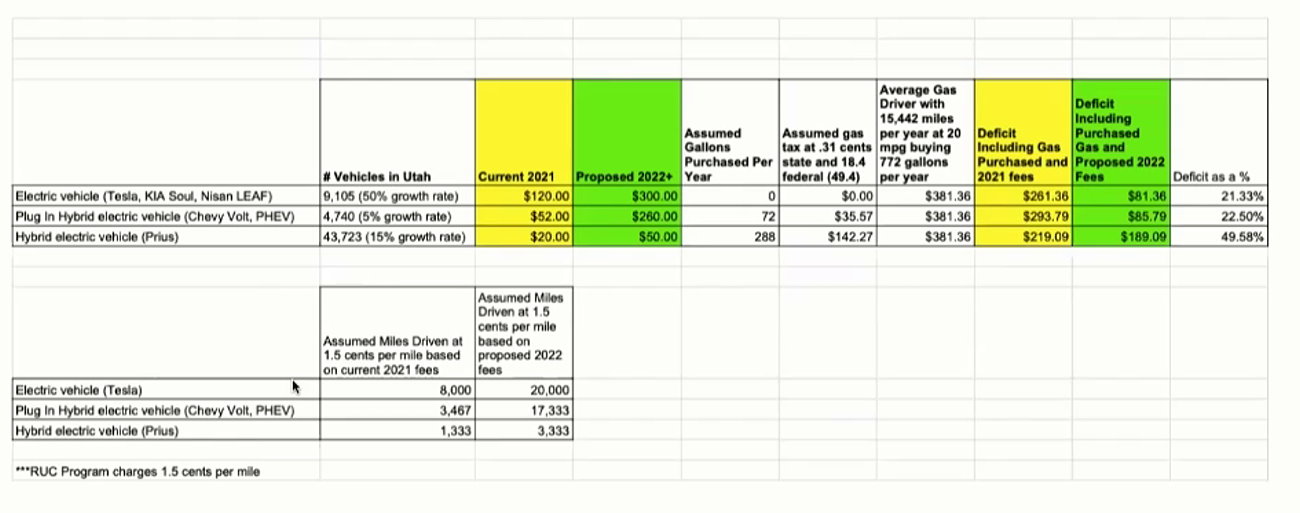ST. GEORGE — Registration fees for electric and hybrid vehicles in Utah could become the highest in the nation if a bill that recently cleared a House committee makes it through the rest of the legislative process.

Vehicle Registration Fee Revisions, designated HB 209 in the 2021 Utah Legislature, passed the House Transportation Committee in a 6-4 vote Monday. The bill, sponsored by Rep. Kay Christofferson, R-Lehi, would raise registration fees between $50 and $300 on electric vehicles, plug-in hybrid vehicles, gas-electric hybrid vehicles and other alternative fuel vehicles.
Sen. Wayne Harper, R-Taylorsville, the Senate sponsor of the bill, presented the legislation to the House committee on behalf of Christofferson, who was sick at home at the time. Harper said the purpose of HB 209 is to get the owners of alternative-fuel vehicles to “pay their fair share” of the state’s road maintenance.
The state’s transportation infrastructure is largely funded through the state’s gas tax – a tax that has seen less yield over the years due the rollout of more fuel efficient vehicles. The introduction of fuel-alternative vehicles and their rising popularity also hasn’t helped much.
While the drivers of gas-powered vehicles – which account for 98% of the vehicles on Utah roads – still pay for road maintenance through the gas tax, people who own electric and hybrid vehicles largely escape paying that tax, Harper said.

Under the bill, registration fees on electric vehicles would jump from $120 to $300. Examples of this are Telsa-brand vehicles, the Nissan Leaf and the Chevrolet Bolt.
Plug-in hybrid vehicle registration, such as the Kia Niro and Chevrolet Volt, would go from $52 to $260.
Hybrid electric vehicles, like the Toyota Prius, would increase from $20 to $50.
Rep. Suzanne Harrison, D-Draper, who voiced her opposition to the legislation, said increasing the fees will deter people from buying more environmentally-friendly vehicles.
“We have some of the worst air quality in the nation, and this bill would increase EV (electric vehicle) fees to the highest in the nation,” she said. “This sends the wrong message to Utahns.”
David Haralson, an owner of a plug-in hybrid car, called the fee hikes punitive toward people who may want to buy electric or hybrid cars. He suggested that Utah lawmakers do more to fix the state’s gas tax instead, like adjusting it for inflation.

Rusty Cannon, vice president of the Utah Taxpayers Association, was a part of the presentation before the House Transportation Committee and said the owners of electric and hybrid vehicles would still be paying less under HB 209 than what regular Utah drivers pay for gas annually.
Based on numbers taken from the Utah Department of Transportation, Cannon said Utahns drive an average of 15,442 miles in Utah per year at 20 miles per gallon, which amounts to an estimated 772 gallons of gas annually, which costs Utah drivers an estimated $381. Currently, the owners of electric vehicles are paying $261 less, Cannon said, and should be paying more in order to balance out the cost of using the road.
Even if the legislation passes with the increased fees, which would take effect in 2022, electric and hybrid drivers would still be paying less than gas-powered drivers, according to the numbers presented by Cannon.
“You’re still going to pay less than every gas driver does,” Cannon said.
Drivers of electric and hybrid vehicles have an option to pay less depending on how much they drive. Utah is currently running a Road User Charge program that began to be looked at in 2019 and has since been implemented by UDOT.
The program, which is voluntary, currently charges 1.5 cents per mile for an electric vehicle, putting the break-even point at around 8,000 miles driven in a year. Under HB 209, that break-even point goes up to 20,000 driven miles.
Fees applied by the road user program wouldn’t go above the proposed registration fee, Cannon said.
Both Harper and Cannon said there is a hope that HB 209, if adopted, will encourage drivers to move to the Road User Charge program. Harper added that he would like to see gas-powered car drivers enroll in the program at some point as well.
House 209 now goes to the House floor for consideration.
For a complete list of contacts for Southern Utah representatives and senators, click here.
Check out all of St. George News’ coverage of the 2021 Utah Legislature here.
Copyright St. George News, SaintGeorgeUtah.com LLC, 2021, all rights reserved.